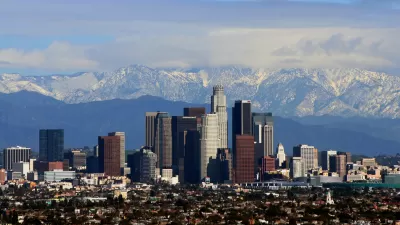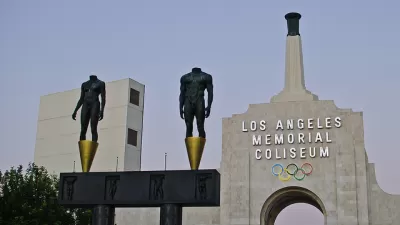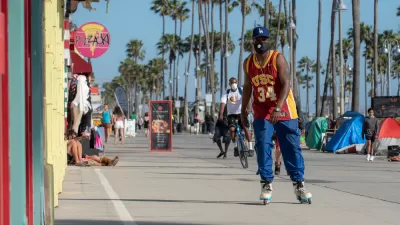The city could give 2,000 families $1,000 a month in what would be the largest program of its kind in the country.

If approved, a $24 million guaranteed income program in Los Angeles would be "the largest experiment of its kind in the United States" to date, writes Libby Denkmann in LAist. "Under the proposal, dubbed 'BIG: LEAP' (Basic Income Guaranteed: L.A. Economic Assistance Pilot), 2,000 Angeleno families at or below the federal poverty line would receive $1,000 a month for one year, no strings attached."
Los Angeles mayor Eric Garcetti told LAist "For families who can't think past the next bill, the next shift or the next health problem that they have, we can give them the space to not only dream of a better life, but to actualize it." The plan will likely include additional selection criteria such as "supporting a child under the age of 18 and a demonstrated medical or financial hardship connected to COVID-19."
"If successful, the Los Angeles pilot would serve as a major proof-of-concept for direct cash assistance that is divorced from the work requirements attached to many safety net programs for poor Americans, such as the Earned Income Tax Credit."
The concept of guaranteed income is nothing new. According to Michael Tubbs, former mayor of Stockton and one of the first city officials to push for a guaranteed income program in their city, "Dr. King called for guaranteed income in 1967. But the pandemic really illustrated the ways the economy isn't working for many people," paving the way for more cities across the country to consider some type of cash assistance. "It's a really important time to revisit the assumptions that have been underlying our existing welfare programs," says Nika Soon-Shiong, program director for the city of Compton's guaranteed income program, which launched this January.
FULL STORY: $1,000 A Month, No Strings Attached: Garcetti Proposes A Guaranteed Basic Income Pilot In Los Angeles

Trump Administration Could Effectively End Housing Voucher Program
Federal officials are eyeing major cuts to the Section 8 program that helps millions of low-income households pay rent.

Planetizen Federal Action Tracker
A weekly monitor of how Trump’s orders and actions are impacting planners and planning in America.

Ken Jennings Launches Transit Web Series
The Jeopardy champ wants you to ride public transit.

New Mexico Aging Department Commits to Helping Seniors Age ‘In Place’ and ‘Autonomously’ in New Draft Plan
As New Mexico’s population of seniors continues to grow, the state’s aging department is proposing expanded initiatives to help seniors maintain their autonomy while also supporting family caregivers.

USDOT Waters Down Self-Driving Car Regulations
The agency is reducing reporting requirements for autonomous vehicles and cars with self-driving features, prompting concern among safety advocates who say transparency is essential to the safe deployment of AV technology.

‘Minnesota Nice’ Isn’t so Nice When You Can’t Find a Place to Live
The Economic Development and Housing Challenge Program can help address the scourge of homelessness among Indigenous people.
Urban Design for Planners 1: Software Tools
This six-course series explores essential urban design concepts using open source software and equips planners with the tools they need to participate fully in the urban design process.
Planning for Universal Design
Learn the tools for implementing Universal Design in planning regulations.
Heyer Gruel & Associates PA
Ada County Highway District
Institute for Housing and Urban Development Studies (IHS)
City of Grandview
Harvard GSD Executive Education
Toledo-Lucas County Plan Commissions
Salt Lake City
NYU Wagner Graduate School of Public Service





























